Retro Replay Review
Gameplay
Yume Penguin Monogatari’s gameplay hinges on a novel weight-loss mechanic that directly impacts how you navigate each stage. You control Penta, a love-struck penguin determined to win Penko’s heart, but his heavy build makes him slow and vulnerable. To slim down, you must collect Fat-B-Gone items scattered throughout levels, with each pill gradually reducing Penta’s girth and unlocking new movement and attack options.
(HEY YOU!! We hope you enjoy! We try not to run ads. So basically, this is a very expensive hobby running this site. Please consider joining us for updates, forums, and more. Network w/ us to make some cash or friends while retro gaming, and you can win some free retro games for posting. Okay, carry on 👍)
In his chubby form, Penta’s primary move is a ground-pound belly flop, which can crush weaker enemies and break through certain blocks. Once he shrinks to a “normal” size, he gains a swift kick attack that’s great for dispatching foes from a safe distance. When fully slim, Penta becomes agile, able to jump higher and shoot projectiles—transforming from a lumbering heavyweight to a nimble sharpshooter.
The game’s level design complements this transformation theme by including obstacles and enemy placements tailored to each weight class. In early stages, food hurlers and slow-moving traps challenge your ability to avoid hits, while later areas introduce narrow platforms and projectile-immune enemies that force you to stay thin and precise. On top of this, each stage has a strict timer, so you’re constantly balancing exploration with the need to reach Penko before time runs out.
Diversity in level hazards—ranging from rampaging crabs on a tropical beach to mischievous snowflakes in icy sections—keeps the experience fresh. Collectible items like time extensions and invincibility icons offer occasional reprieves, but the core satisfaction comes from mastering Penta’s evolving moveset and timing your transformations to clear obstacles with style.
Graphics
For an early ’90s Famicom title, Yume Penguin Monogatari boasts surprisingly vibrant visuals. Character sprites are distinct and expressive: Penta’s round form jiggles comically when he moves, while his lean silhouette exudes confidence. Enemies like cheeky food-throwing goons and oversized dessert-themed bosses appear colorful and cartoonish, adding to the game’s lighthearted charm.
Backgrounds feature layered parallax effects that give stages a sense of depth, from gently swaying palm trees to distant mountain peaks. Subtle animations—rippling water, drifting clouds, and flickering torches—bring each environment to life despite the hardware’s limitations. The transition between weight forms is accompanied by a quick flashing effect, neatly signaling your new abilities without disrupting pacing.
Special effects, such as the sparkle that trails Fat-B-Gone pills or the explosion when a belly flop connects, are simple yet satisfying. While pixel-perfect platformers have come a long way, Yume Penguin Monogatari’s art direction remains charming in its straightforwardness, trading high resolution for personality and clear visual feedback.
Character portraits in intermission screens also add a narrative touch, showing Penta’s enthusiasm and Penko’s coy reactions. Though there’s no voice acting, the combination of sprite work and in-game text delivers all the story beats you need in a playful, manga-inspired style.
Story
At its heart, Yume Penguin Monogatari tells a classic tale of unrequited love with a whimsical twist: Penta must lose weight to win Penko’s affection. The premise is introduced via a brief opening scene where Penko’s current beau, the suave Ginji, mocks Penta’s size and unleashes his goons to keep our hero at bay.
Each level represents Penta’s emotional journey, from the sunny park where he first spots Penko to the daunting castle that serves as Ginji’s stronghold. Along the way, lighthearted cutscenes depict Penta’s determination, Penko’s fleeting interest, and Ginji’s growing frustration. The simple narrative never overstays its welcome, delivering just enough context to motivate your platforming exploits.
The story’s humor stems from its exaggerated premise—food as both an obstacle and the very thing you must avoid—and the recurring gags of Penta being pelted with cakes and pies. While the script is minimal, the expressive sprite work and playful dialogue boxes convey character personalities effectively, making you root for Penta even in the toughest moments.
Ultimately, the story culminates in a showdown against Ginji, whose own physique and fighting style contrast sharply with Penta’s transformed lean form. The resolution is sweet and satisfying, providing a feel-good conclusion that underscores the game’s message about determination and self-improvement.
Overall Experience
Yume Penguin Monogatari stands out among retro platformers for its unique weight-based mechanic and lighthearted narrative. The constant push to shed pounds adds a strategic layer to standard run-and-jump action, forcing you to adapt your approach based on Penta’s current size. This dynamic keeps the gameplay loop engaging from start to finish.
The difficulty curve is firm but fair. Early stages ease you into the controls and transformation gimmick, while later levels demand precision jumps and quick reflexes. The timer system injects tension into each run, turning simple fetch quests for Fat-B-Gone into thrilling sprints against the clock. Occasional checkpoints and hidden shortcuts reward attentive players who dive deep into level layouts.
Audible charm comes courtesy of upbeat chiptune melodies that match each stage’s setting. From cheerful beach shanties to dramatic castle themes, the soundtrack reinforces the game’s whimsical tone. Sound effects—belly flops, kicks, and the satisfying “ding” of grabbing a pill—are punchy and clear, making each action feel gratifying.
For modern audiences, Yume Penguin Monogatari offers a nostalgic trip back to the golden era of 2D platformers, enriched by its memorable protagonist and clever gimmick. Though its pixel count may feel antiquated today, the core design shines through, delivering a compelling challenge wrapped in an endearing story. If you’re after a playful, inventive take on classic platform action, Penta’s weight-loss quest is an adventure worth embarking on.
 Retro Replay Retro Replay gaming reviews, news, emulation, geek stuff and more!
Retro Replay Retro Replay gaming reviews, news, emulation, geek stuff and more!
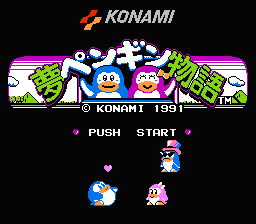
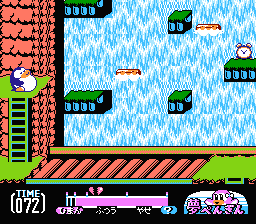
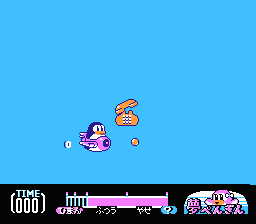
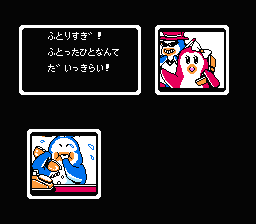
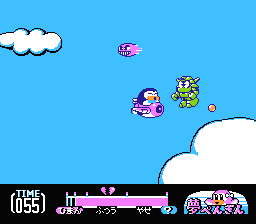



Reviews
There are no reviews yet.